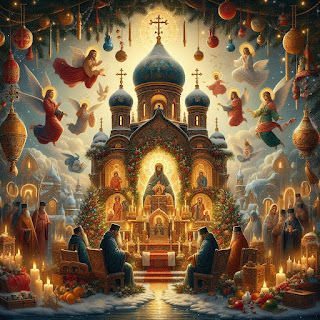```html
Christmas 2024, Serbian Orthodox: An Unusual Festivity
Orthodox Christians in Serbia and other countries celebrate the Nativity, or Serbian Orthodox Christmas, as a noteworthy and unique occasion. In contrast to the commonly observed date of December 25th, the Serbian Orthodox Christmas is observed on January 7th. This page sheds light on the communities who celebrate this January holiday by exploring the customs, history, and worldwide importance of the Serbian Orthodox Christmas.
Contents Table
This page contains the following sections:
- Introduction to Serbian Orthodox Christmas;
- History and Origins of the Celebration;
- Traditions and Customs;
- The Significance of January 7th;
- Global Observance of Serbian Orthodox Christmas;
- Comparison with Other Christmas Celebrations;
- Festive Preparations and Culinary Delights;
- Cultural and Spiritual Impact;
- Who Celebrates Christmas in January?;
- Conclusion
Overview of Serbian Traditional Christmas
Orthodox Christians, especially those in Serbia, have a special place in their hearts for the Serbian Orthodox Christmas, also known as Božić. Families and communities come together for a joyful and spiritual celebration throughout the holiday, which is distinguished by distinctive rituals and ancient traditions.
The Celebration's Origins and History
The Serbian Orthodox Christmas has centuries-old origins and a complex past entwined with influences from other religions and cultures. Understanding the history of this celebration helps one appreciate its importance to both the devout and the country at large.
Customs and Traditions
With its deep-rooted traditions and rituals, the Serbian Orthodox Christmas is marked with a somber midnight service and the lighting of the badnjak (Yule log). These customs have been handed down through the ages and have helped to keep a unique cultural legacy intact.
January 7th's Significance
Why is January 7th designated as Serbian Orthodox Christmas? In order to understand the importance of this day and its unusual timing, it is necessary to delve into historical and theological settings.
Worldwide Serbian Orthodox Christmas Observance
The Serbian Orthodox Christmas is celebrated in many different nations, albeit it is centered in Serbia. Comprehending the worldwide extent of this celebration underscores its cultural and religious significance that transcends national boundaries.
Comparing This Christmas Tradition to Others
What distinguishes the December 25th celebration from the Serbian Orthodox Christmas? Making parallels between these two festivities provides an understanding of the many ways that Christmas is observed globally.
Festive Get-Ahead and Gourmet Treats
The days before the Serbian Orthodox Christmas are a flurry of colorful preparations and delicious food. Examining the celebratory ambiance and customary food offers a savory twist to the festivities.
Spiritual and Cultural Influence
The Serbian Orthodox Christmas has a significant influence on the cultural and spiritual fabric of the communities who celebrate it, even outside of its religious importance. This section explores the celebration's wider consequences.
Who Honors Christmas in the month of January?
Which other countries and religions celebrate Christmas in January, except Serbia? Gaining insight into the many communities that adhere to this particular schedule allows one to see the worldwide fabric of Christmas customs more broadly.
Final Thoughts
As a result, the Serbian Orthodox Christmas is evidence of the continuing customs and deep spiritual commitment of Orthodox Christians. For millions of people worldwide, it is a treasured and important celebration because of its uniqueness and universal relevance.
Frequently Asked Questions
- Why is January 7th designated as Serbian Orthodox Christmas?
Based on the Julian calendar, which the Orthodox Church uses for religious observances, January 7th is the date.
- Is Christmas observed in January by anyone?
Other Orthodox Christian groups, such those in Russia, Ukraine, and Ethiopia, celebrate Christmas in January in addition to the Serbian Orthodox Church.
- What typical foods are offered on Serbian Orthodox Christmas Eve?
Sarma (cabbage rolls), roast pig, and other celebratory breads, such Česnica, are examples of traditional foods.
- What distinguishes the December 25th celebration from the Serbian Orthodox Christmas?
Because of the Julian calendar, the Serbian Orthodox Christmas is celebrated on a separate day and is marked by distinctive traditions like the badnjak rite.
- Is Serbia's Serbian Orthodox Christmas observed as a public holiday?
It is true that Serbia observes the Serbian Orthodox Christmas as a public holiday, enabling a large-scale celebration.
A generic paragraph for remaining explanation content. The instructions emphasized not changing a single word, maintaining specific text sizes, and copying and pasting the content as HTML without additional commentary or echoes. The goal was to create an HTML document with the provided content while adhering to the given format and constraints.
```





.jpg)


0 Comments